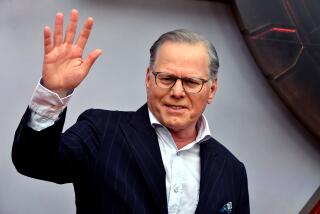He May Be Working for Someone Else, but He’s Still Ted Turner
Rumors of Ted Turner’s retirement to his Montana ranch may be greatly exaggerated judging from three recent behind-the-scenes developments since Time Warner and Turner Broadcasting System announced a $6.7-billion merger a year ago.
The incidents suggest that Turner’s mercurial founder, who will become vice chairman of Time Warner when the merger closes next month, will make liberal use of his special authority as the company’s largest shareholder, in some cases even if it embarrasses his new boss, Chairman Gerald Levin.
The economic imbalance puts Levin in a particularly awkward position, since he has staked his career on the merger. Levin was vulnerable even before proposing to tie the knot with Turner because of the company’s inert stock price. Many shareholders are unhappy with the dilutive effects of the Turner merger, and any tensions that arise between the Turner and the Time Warner camps are likely to bring on a queasy sense of deja vu: The company has yet to demonstrate benefits from the merger between Time and Warner Communications in 1990.
Sources close to Ted Turner say he was instrumental in Time Warner’s decision last week to carry on its cable systems MSNBC rather than News Corp.’s new 24-hour news channel. To secure government approval for the merger, regulators have ordered Time Warner, the nation’s second-largest cable system, to carry another news channel to compete with Turner’s entrenched Cable News Network.
Time Warner’s decision to throw its weight behind MSNBC, a partnership of Microsoft and NBC, came as a shock to News Corp., which claims to have had an agreement from late August with Time Warner. Sources at Fox say News Corp. Chairman Rupert Murdoch and Levin had a handshake deal worth more than $120 million to Time Warner under which News Corp. would have paid the cable company $12 per subscriber to launch the service in more than 5 million homes with cable by the end of the year and in almost that many more households in 1997.
Sources say Turner was the spoiler. “The only person Turner is afraid of in the world is Rupert Murdoch,” said one executive, recalling Turner’s long-standing rivalry with Murdoch and his promise last year to squish him like “a bug” in the cable news wars.
Sources close to Turner say he changed Time Warner’s direction on the deal because he feared it would give Fox the lead by next year over MSNBC, which launched in July with about 20 million subscribers. Tele-Communications Inc., the leading cable operator, owns 30% of Fox’s news channel and has agreed to carry it on 10 million homes when it launches next month.
“We had a documented agreement waiting to be signed and multiple assurances that it would be the second thing to be done after getting regulatory approval for the merger,” said Chase Carey, chairman and chief executive of Fox Television. “For them to make a deal with MSNBC the day after getting government approval raises the question of whether this was all a lie from the start to create the impression in the marketplace that they are being non-exclusionary. It’s beyond explanation.”
Time Warner says it never signed a deal with News Corp. but does not rule out eventually carrying both MSNBC and Fox News despite the scarce vacancies for new channels on its systems.
The shift could prove to be costly to Time Warner. News Corp. is threatening to use its role as a global gatekeeper to block Time Warner’s entry to world markets. Carey said Fox has taken a few steps in retaliation already, but would not elaborate.
“If the top-level executives of the company are not going to conduct themselves with a sense of integrity, then we will have to reevaluate how we do business with them,” Carey said, indicating that Time Warner channels on News Corp. satellite systems around the world would be vulnerable.
Time Warner may have trouble launching two new channels on News Corp.’s BSkyB satellite service in Britain. Sources say Murdoch has threatened to knock Time Warner’s HBO channel off its Latin American satellite service.
Turner also exercised his muscle recently by derailing a proposed management structure would have merged most of his cable assets into Warner Bros.
Until last month, sources say, Levin was pushing for all of Turner’s operations to be integrated into three divisions: entertainment, news and information, and cable systems. CNN was to be lumped with Time Warner’s magazines in the news and information group; and Turner’s four other cable networks, plus Time Warner’s HBO, would be managed by Warner Co-Chairmen Robert Daly and Terry Semel, as would Turner’s studio operations.
“It was an idea floated by corporate,” said a source close to Time Warner. “It was partly driven by economics, the thinking that money could be saved by merging duplicative operations, and partly by the thought that if Ted didn’t have an operational base, he’d be in Montana at his ranch.”
Sources say Turner hit the roof when Newsweek published an article in late July suggesting that Daly and Semel would take over the bulk of the Turner assets. The article portrayed Levin’s dilemma this way: “How does he install them [Daly and Semel] over the Turner entertainment operations without alienating Turner himself?”
One source close the company says Turner executives were never formally asked to report to Daly and Semel but that “things were definitely heading in that direction before the Newsweek article.”
Turner insisted on adhering to the original agreement, which put him in control of a network division that includes HBO. Last week, Time Warner announced that Turner would supervise the network arm, composed of cable networks including HBO, CNN, TNT, TBS, Cartoon Network and Turner Classic Movies.
Time Warner maintains it has never strayed from that plan.
Many in Time Warner believe CNN has little in common with the news group, which includes magazines like People and Sports Illustrated, but some predict that the four entertainment networks could eventually become part of Warner Bros. Others, however, say that with the world’s largest studio and largest music group--in addition to a TV network and a retail chain--Semel and Daly would hardly have time to manage the world’s largest cable family.
The fate of Turner’s New Line Cinema Corp. also has become a divisive issue at the two companies, with Levin and his corporate aides favoring an outright sale of the division to help pay down $1 billion or more of the companies’ combined $17 billion in debt, according to sources.
Though many in the company believe the operation is duplicative with Time Warner’s movie and TV units and therefore should be sold, Turner has steadfastly objected. Last week, the company retained an investment banker to assess alternatives, but it now is said to be leaning toward selling only a portion of the asset.
More to Read
The biggest entertainment stories
Get our big stories about Hollywood, film, television, music, arts, culture and more right in your inbox as soon as they publish.
You may occasionally receive promotional content from the Los Angeles Times.










